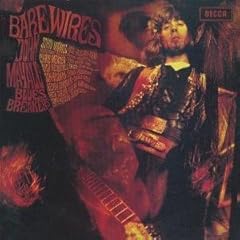
While we're on the subject of my early immersion in the blues, Bare Wires is the first album I bought with my own money.
I'm not sure where I heard about John Mayall. I don't think it was from listening to the Subterranean Circus on WCFL out of Chicago on my AM radio. It may have been something I read in Hit Parader magazine. Whatever prompted me to do it, I bought the album in 1968 when I was twelve and immediately loved it, especially "Killing Time" and a lot of the "Bare Wires Suite".
The guitar work of Mick Taylor was a lot of what drew me in. I hadn't gotten to hear his predecessors Peter Green or Eric Clapton in the Mayall band, so I had no comparisons I could draw. Mick just sounded so sweet, and his tone was gorgeous, very complementary to the original tunes Mayall wrote.
I was an inveterate listener and contest-entrant at WTOB, Winston-Salem's Good Guy radio station. Once, I won my choice of a free album there, so I trotted up to the studio at Thruway Shopping Center and went rifling through the box, past the fuzzy Odessa album by the Bee Gees and sundry other treasures. I took home Blues From Laurel Canyon, Mayall's last album with Taylor on lead guitar. By then the Bluesbreakers had lost drummer Jon Hiseman, bassist Tony Reeves and sax player Dick Heckstall-Smith to the nascent Colosseum, and the band was a rocking little four-piece. Taylor had more solos and sounded stellar.
It was thrilling for me to see Mick Taylor gravitate to the Rolling Stones for what I feel is their best recorded period. Even though his contribution to that band has been unfairly overlooked, it stands as some of the best playing in their sizeable canon of works.
Mayall's singing voice reminds me now somewhat of Grover from Sesame Street, but at the time, I didn't think of it, probably because Sesame Street was a year away from its debut.
And who could not love Dick Heckstall-Smith, if only for his quintessentially British name alone? What a huge link in the history of blues and jazz in England... (I still kick myself for missing an opportunity years later in London to see Dick perform jazz in a small pub, damn it. He died in 2004.)
Bare Wires hasn't held up as well as some of the albums that were contemporaneous, but it helped me find out more about the blues. At twelve, I needed all the help I could get.
***
On that note, I think about how people like the Rolling Stones, the Beatles and even the Dave Clark Five were able to transmit the knowledge they had about American blues and r 'n' b back out via their repetoires, so that young whelks like me could then look for the source and find people like Howlin' Wolf, Don Covay, Larry Williams and Chris Kenner. That transmission was so important, and I hope that today's performers find young listeners who thirst to find the roots of the music they relate to.
1 comment:
I love it! John "Grover" Mayall. You put a smile on my Sesame-Street-generation face.
You are so right regarding the knowledge of American blues transmitted by those 60s era artists. Thanks Peter!
Post a Comment